Secret Service Discontinues Security Detail for Robert F. Kennedy Jr. Following Campaign Suspension
In a development that has raised eyebrows and sparked discussions across political spectrums, the U.S. Secret Service has announced it will no longer provide security for Robert F. Kennedy Jr. The decision comes in the wake of Kennedy's suspension of his presidential campaign, as confirmed by law
In a development that has raised eyebrows and sparked discussions across political spectrums, the U.S. Secret Service has announced it will no longer provide security for Robert F. Kennedy Jr. The decision comes in the wake of Kennedy's suspension of his presidential campaign, as confirmed by law enforcement sources close to the matter.
Robert F. Kennedy Jr., known for his vocal criticisms of the Biden administration and his run as an independent candidate, had been under Secret Service protection due to his presidential candidacy. However, with the campaign now suspended, the Secret Service, traditionally tasked with protecting current and former national leaders and their immediate families, has deemed the continuation of his security detail unnecessary.
The move has not gone without controversy. Supporters of Kennedy, including various figures on social media platforms like X, have expressed outrage over the decision, citing his family's tragic history with political assassinations. Critics argue that this decision might reflect poorly on the administration's commitment to the safety of all political figures, regardless of their current campaign status.
Political analysts have pointed out that while the Secret Service's decision is standard procedure post-campaign suspension, the timing and the figure involved have added layers of scrutiny. Kennedy's campaign, though suspended, had garnered significant attention, especially among voters disillusioned with the mainstream political offerings.
The Secret Service's criteria for protection typically include the candidate's status in the election cycle, polling numbers, and specific threats against them. Kennedy, despite his suspension, still holds a notable public profile which might warrant concern over his safety. However, without an active campaign, the formal justification for Secret Service protection diminishes.
This decision has also reignited debates over the criteria for Secret Service protection for presidential candidates. Critics argue that in an age where political violence seems to be on the rise, perhaps the criteria should be revisited to ensure the safety of all high-profile political figures, especially those with historical reasons for concern.
As of now, Kennedy's team has not publicly commented on the Secret Service's decision, leaving many to speculate on his next steps in the political arena or his personal security arrangements. The broader implications of this move might also influence future discussions on how political figures are protected, particularly those outside the traditional two-party system.
This story continues to develop, reflecting broader themes of political security, the role of independent candidates, and the public's perception of fairness in political treatment.

